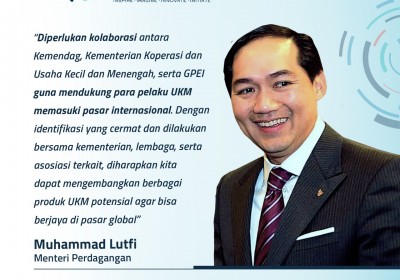Government Targets 500,000 New Exporters by 2030
March 18, 2021
Jakarta – Through the Trade Ministry (Kemendag), the Indonesian government is encouraging local small and medium-scale businesses (UKM) to penetrate the export market.
Indonesia aims to generate 500,000 new exporters by 2030. One of the ways to achieve this goal is to strengthen partnerships between government institutions and relevant organizations and businesses.
Trade Minister Muhammad Lutfi explained that the plan to help UKMs penetrate the export market came directly from President Joko Widodo. “Effective partnerships between the Trade Ministry (Kemendag), the Micro, Small and Medium Businesses and Cooperatives Ministry (KemenkopUKM) and the Indonesian Exporters Association (GPEI) must be fostered in order to help UKMs enter the global market,” he said during the ‘Accelerating Partnerships to Create 500,000 Exporters by 2030’ program launch event in Jakarta on Wednesday (17/2).
Minister Lutfi explained that several factors need to be considered before UKMs are deemed ready for exporting, mainly the identification of which UKM products are ready for export, the quality consistency of UKM products, the easiness in obtaining export permits and the obtaining of information regarding potential destination markets.
With the right partnerships, Minister Lutfi added, businesses will be able to fully reap the benefits of the government’s programs.
“Through the thorough assessment by relevant ministries, institutions and associations, we hope that we can develop a good number of UKMs to be able to compete in the global market. We hope that these assistance programs could ease their operations as well,” he said.
Kemendag data shows that there are 13,177 exporting Indonesian UKMs, who represent 90% of the country’s total national exports between January and September 2020. Most of the exported products include timber and wood-based products, fish and shellfish, furniture, lights, coffee, tea, spices, machinery, plastic and plastic-based products, vegetable oil, clothing and accessories, fruits, and electronic devices.
Small and Medium Businesses and Cooperatives Minister (MenkopUKM) Teten Masduki said that this year, his ministry is stepping up several crucial initiatives to help UKMs increase their production and export capacities, such as assisting UKMs to enter formal sectors, improving economic management mechanisms of business cooperatives and developing UKMs based on leading commodities.
“This would make it easier for UKMs to enter the global supply chain and also bolster the amount of UKMs adopting digital methods and mechanisms,” Minister Teten explained.
KemenkopUKM data shows that UKMs currently contribute 14.37% to the export market, despite UKMs making up to 86% of all active businesses in Indonesia.
“It’s still a bit of a challenge for UKMs to penetrate the export market due to a lack of information on their potential markets, the lack of certification and the high fees related to obtaining one, inconsistent product quality, low production capacity and various logistical issues,” Minister Teten outlined.
Ironically, as one of the largest agrarian countries in the world, Indonesia possesses significant comparative advantage compared to other countries. Indonesia is able to play a bigger role in the global market through potential exports from its leading sectors such as agriculture, fishery, furniture, cosmetics, herbal products, indigenous products and Muslim fashion.
“I hope that UKMs could take full advantage of government assistance to eventually capture this large opportunity and contribute further to our exports,” he said.
Send us your ideas on how Indonesia’s UKMs can penetrate the global export market through Indonesia Development Forum’s social media pages!
Indonesia’s Research Institutions Supporting the Development of the Electric Vehicle Industry
Indonesian Muslim Fashion and Cosmetics IKMs Shine at Dubai World Expo 2020
Govt Steps Up UMKM Transformation Efforts in the Midst of Pandemic Slowdown
Govt Encourages Promotion of IKM Products in Digital Era
Government Begins Developing Maritime Training Center in Makassar
Tweets by IDDevForum
